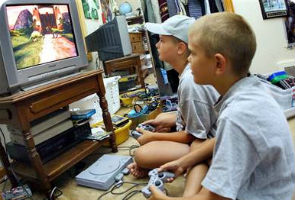- Home
- Games
- Games News
- Too much gaming makes kids obese, aggressive and violent
Too much gaming makes kids obese, aggressive and violent
By Press Trust of India | Updated: 5 June 2012 01:58 IST

Click Here to Add Gadgets360 As A Trusted Source

Advertisement
Excessively playing video games can generate agreater risk of obesity, aggression and violent behaviour in children and teenagers, finds a new survey.
The recent survey by Assocham reveals that over 82 per cent of teenagers spend an average of 14-16 hours per week playing games on computer, web portal or consoles and about 7 per cent of children surveyed qualified as being pathological video gamers (over 20 hours per week).
Gaming is taking away time that could be spend on activities that have educational benefits. Compulsive gamers display signs of diminished empathy, increased aggression and conflicts at home, school and work. It could also create problems and lead to poor social skills.
Rising addiction to video games include easy availability of resources and absence of quality parental care reveals the survey conducted under Assocham's Social Development Foundation (SDF).
Over 2,000 teenagers and 1,000 parents' were interviewed by Assocham-SDF during April 2011 to June 2011 in Delhi-NCR, Mumbai, Chandigarh, Lucknow, Ahmedabad, Patna, Kolkata, Chennai, Bengaluru and Jaipur.
The sample included almost an equal number of males and females in the age group of 8-18 years.
About 84 per cent (ages 8 to 18) of children said that they play violent games when they're alone than with their parents. 76 per cent prefer to play action game and 45 per cent of gamers who shows signs similar to addiction are also more likely to have a video game system in their bedroom.
A total of 1200 teens (76 per cent) played video games.
20 per cent of the gamers were girls and female gamers were found to spend an average of 30 minutes playing on the weekdays and one hour playing on the weekends. Male gamers spend an average of 50 minutes playing on the weekdays and two-three hours playing on the weekends.
Gamers who are going to school account for 72 per cent and college students at 28 per cent. More than half of participants said they played daily, 36 per cent play weekly and 18 per cent play 3-4 times aweek.
Only 36 per cent admitted that they have addictive behaviors and cannot control themselves when they play. 64 per cent responded said that online game makes them feel good and distressed.
The survey also disclosed that over 90 per cent of kids between 8-14 years old go online to play games with Facebook being quoted as their favorite websites.
The social networking games are probably a bigpart of their gaming habits. Above 80 per cent of parents say that videogames are getting worse day by day and some games connect to the internet, which can allow children and adolescents to play online with unknown adults and peers.
"Getting highly involved with video games can become addicting, and parents need to be cautious about how many hours kidsplay," says Dr B K Rao, Chairman Assocham health committee and Sir Ganga Ram Hospital.
Dr. Rao further said that there are concerns about the effect of violent video games on young minds who play videogames excessively.
He also added that children who are exposed toviolence can become "immune" or numb due to the horror of violence, imitate the violence they see, and show more aggressive behaviour with greater are exposure to violence.
"Some children accept violence as a way to handle problems. So the repeated exposure to violence, the greater is the impact on children," he says.
The survey also revealed that 23 per cent of teenager feel "addicted to video games", with about one-third of males (26 per cent) and a little more than one in ten females (11 per cent)feeling "addicted."
On the other hand 44 per cent of teenager saidthat their friends are addicted to games. 30 per cent of parents say they always or sometimes know what games their children play. 12 per cent say they always or sometimes check the ratings before their children are allowed to play a game.
9 per cent of parents say they always or sometimes stop their kids from playing a game 6 per cent of parents say they always or sometimes play games with their children.
Parents of teens who play games are generally neutral on the effect of games on their children, with nearly two-thirds believing that games have no impact one way or the other on their offspring.
62 per cent of parents say that video games have no effect on their child one way or the other. 19 per cent of parents say that video games have a positive influence on their child. 13 per cent of parents say video games have a negative influence on their child.
The recent survey by Assocham reveals that over 82 per cent of teenagers spend an average of 14-16 hours per week playing games on computer, web portal or consoles and about 7 per cent of children surveyed qualified as being pathological video gamers (over 20 hours per week).
Gaming is taking away time that could be spend on activities that have educational benefits. Compulsive gamers display signs of diminished empathy, increased aggression and conflicts at home, school and work. It could also create problems and lead to poor social skills.
Rising addiction to video games include easy availability of resources and absence of quality parental care reveals the survey conducted under Assocham's Social Development Foundation (SDF).
Over 2,000 teenagers and 1,000 parents' were interviewed by Assocham-SDF during April 2011 to June 2011 in Delhi-NCR, Mumbai, Chandigarh, Lucknow, Ahmedabad, Patna, Kolkata, Chennai, Bengaluru and Jaipur.
The sample included almost an equal number of males and females in the age group of 8-18 years.
About 84 per cent (ages 8 to 18) of children said that they play violent games when they're alone than with their parents. 76 per cent prefer to play action game and 45 per cent of gamers who shows signs similar to addiction are also more likely to have a video game system in their bedroom.
A total of 1200 teens (76 per cent) played video games.
20 per cent of the gamers were girls and female gamers were found to spend an average of 30 minutes playing on the weekdays and one hour playing on the weekends. Male gamers spend an average of 50 minutes playing on the weekdays and two-three hours playing on the weekends.
Gamers who are going to school account for 72 per cent and college students at 28 per cent. More than half of participants said they played daily, 36 per cent play weekly and 18 per cent play 3-4 times aweek.
Only 36 per cent admitted that they have addictive behaviors and cannot control themselves when they play. 64 per cent responded said that online game makes them feel good and distressed.
The survey also disclosed that over 90 per cent of kids between 8-14 years old go online to play games with Facebook being quoted as their favorite websites.
The social networking games are probably a bigpart of their gaming habits. Above 80 per cent of parents say that videogames are getting worse day by day and some games connect to the internet, which can allow children and adolescents to play online with unknown adults and peers.
"Getting highly involved with video games can become addicting, and parents need to be cautious about how many hours kidsplay," says Dr B K Rao, Chairman Assocham health committee and Sir Ganga Ram Hospital.
Dr. Rao further said that there are concerns about the effect of violent video games on young minds who play videogames excessively.
He also added that children who are exposed toviolence can become "immune" or numb due to the horror of violence, imitate the violence they see, and show more aggressive behaviour with greater are exposure to violence.
"Some children accept violence as a way to handle problems. So the repeated exposure to violence, the greater is the impact on children," he says.
The survey also revealed that 23 per cent of teenager feel "addicted to video games", with about one-third of males (26 per cent) and a little more than one in ten females (11 per cent)feeling "addicted."
On the other hand 44 per cent of teenager saidthat their friends are addicted to games. 30 per cent of parents say they always or sometimes know what games their children play. 12 per cent say they always or sometimes check the ratings before their children are allowed to play a game.
9 per cent of parents say they always or sometimes stop their kids from playing a game 6 per cent of parents say they always or sometimes play games with their children.
Parents of teens who play games are generally neutral on the effect of games on their children, with nearly two-thirds believing that games have no impact one way or the other on their offspring.
62 per cent of parents say that video games have no effect on their child one way or the other. 19 per cent of parents say that video games have a positive influence on their child. 13 per cent of parents say video games have a negative influence on their child.
Comments
Catch the latest from the Consumer Electronics Show on Gadgets 360, at our CES 2026 hub.
Popular on Gadgets
- Samsung Galaxy Unpacked 2025
- ChatGPT
- Redmi Note 14 Pro+
- iPhone 16
- Apple Vision Pro
- Oneplus 12
- OnePlus Nord CE 3 Lite 5G
- iPhone 13
- Xiaomi 14 Pro
- Oppo Find N3
- Tecno Spark Go (2023)
- Realme V30
- Best Phones Under 25000
- Samsung Galaxy S24 Series
- Cryptocurrency
- iQoo 12
- Samsung Galaxy S24 Ultra
- Giottus
- Samsung Galaxy Z Flip 5
- Apple 'Scary Fast'
- Housefull 5
- GoPro Hero 12 Black Review
- Invincible Season 2
- JioGlass
- HD Ready TV
- Laptop Under 50000
- Smartwatch Under 10000
- Latest Mobile Phones
- Compare Phones
Latest Gadgets
- Red Magic 11 Air
- Honor Magic 8 RSR Porsche Design
- Honor Magic 8 Pro Air
- Infinix Note Edge
- Lava Blaze Duo 3
- Tecno Spark Go 3
- iQOO Z11 Turbo
- OPPO A6c
- Lenovo Yoga Slim 7x (2025)
- Lenovo Yoga Slim 7a
- Lenovo Idea Tab Plus
- Realme Pad 3
- Moto Watch
- Garmin Quatix 8 Pro
- Haier H5E Series
- Acerpure Nitro Z Series 100-inch QLED TV
- Asus ROG Ally
- Nintendo Switch Lite
- Haier 1.6 Ton 5 Star Inverter Split AC (HSU19G-MZAID5BN-INV)
- Haier 1.6 Ton 5 Star Inverter Split AC (HSU19G-MZAIM5BN-INV)
© Copyright Red Pixels Ventures Limited 2026. All rights reserved.


![[Sponsored] Haier C90 OLED TV | Dolby Vision IQ, 144Hz OLED and Google TV in Action](https://www.gadgets360.com/static/mobile/images/spacer.png)









